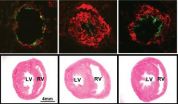(Press-News.org) Three papers published in The Lancet Psychiatry, The Lancet, and The Lancet Oncology reveal that around three-quarters of cancer patients who have major depression are not currently receiving treatment for depression, and that a new integrated treatment programme is strikingly more effective at reducing depression and improving quality of life than current care.
An analysis of data from more than 21 000 patients attending cancer clinics in Scotland, UK, published in The Lancet Psychiatry, found that major depression is substantially more common in cancer patients than in the general population. Major depression was most common in patients with lung cancer (13%) and lowest in those with genitourinary cancer (6%). Moreover, nearly three quarters (73%) of depressed cancer patients were not receiving treatment.
To address the problem of inadequate treatment the SMaRT Oncology-2 randomised trial, published in The Lancet, evaluated the effectiveness of a new treatment programme called 'Depression Care for People with Cancer' (DCPC). DCPC is delivered by a team of specially trained cancer nurses and psychiatrists, working in collaboration with the patient's cancer team and general practitioner, and is given as part of cancer care. It is a systematic treatment programme that includes both antidepressants and psychological therapy.
The trial, involving 500 adults with major depression and a cancer with a good prognosis (predicted survival more than 12 months) compared DCPC with usual care [1]. DCPC was strikingly more effective at reducing depression. At 6 months, 62% of the patients who received DCPC responded to treatment (at least a 50% reduction in the severity of their depression) compared with only 17% of those who received usual care. This benefit was sustained at 12 months. DCPC also improved anxiety, pain, fatigue, functioning, and overall quality of life. Moreover, the cost of providing DCPC was modest (£613 per patient) making it a cost-effective way to improve cancer patients' quality of life.
According to lead author Professor Michael Sharpe from the University of Oxford in the UK, "The huge benefit that DCPC delivers for patients with cancer and depression shows what we can achieve for patients if we take as much care with the treatment of their depression as we do with the treatment of their cancer." [2]
To see if patients with a poor prognosis cancer could also benefit from this approach, the SMaRT Oncology-3 randomised trial, published in The Lancet Oncology, tested a version of DCPC adapted for patients with a typically poor prognosis cancer (lung cancer). The trial, involving 142 patients with lung cancer and major depression, found that those who received the lung cancer version of DCPC had a significantly greater improvement in depression than those who received usual care during 32 weeks of follow-up. The lung cancer-specific version of DCPC also improved anxiety, functioning, and quality of life.
According to study leader Dr Jane Walker from the University of Oxford and Sobell House Hospice in Oxford in the UK, "Patients with lung cancer often have a poor prognosis. If they also have major depression that can blight the time they have left to live. This trial shows that we can effectively treat depression in patients with poor prognosis cancers like lung cancer and really improve patients' lives." [2]
INFORMATION:
NOTES TO EDITORS:
These studies were conducted by researchers at the Universities of Oxford and Edinburgh, UK. The work was funded by Cancer Research UK and the Chief Scientist Office of the Scottish Government.
[1] Usual care is provided by a patient's general practitioner who may prescribe antidepressants or refer patients to mental health services for assessment or psychological treatment.
[2] Quotes direct from authors and cannot be found in text of Articles.
The Lancet journals: Three-quarters of depressed cancer patients do not receive treatment for depression but a new approach could transform their care
2014-08-28
ELSE PRESS RELEASES FROM THIS DATE:
Better health care as important as controlling risk factors for heart health
2014-08-28
Hamilton, ON (August 27, 2014) – Keeping a healthy heart may have as much to do with the quality of health care you have available as it does you avoiding risk factors such as smoking, bad diet and little exercise.
A large international study led by researchers at the Population Health Research Institute at McMaster University and Hamilton Health Sciences has found a that low-income countries which have people with the lowest risk factors for cardiovascular problems have the highest rates of cardiovascular events and death, while the high-income countries of people with ...
Researchers investigating new treatment for multiple sclerosis
2014-08-27
MINNEAPOLIS – A new treatment under investigation for multiple sclerosis (MS) is safe and tolerable in phase I clinical trials, according to a study published August 27, 2014, in Neurology® Neuroimmunology & Neuroinflammation, a new online-only, freely accessible, specialty medical journal. The publication is part of the Neurology® family of journals, published by the American Academy of Neurology.
The phase I studies were the first to test the drug candidate in humans. Studies with animals showed that the drug, which is called anti-LINGO-1, or BIIB033, may be able to ...
Bundled approach to reduce surgical site infections in colorectal surgery
2014-08-27
Bottom Line: A multidisciplinary program (called a "bundle") that spanned the phases of perioperative care helped reduce surgical site infections (SSIs) in patients undergoing colorectal surgery (CRS) at an academic medical center.
Author: Jeffrey E. Keenan, M.D., of the Duke University Medical Center, Durham, N.C., and colleagues.
Background: SSIs are associated with increased complications, length of hospital stay, readmission rates and health care costs. Efforts that have used systematic approaches, called bundles, that aim to incorporate best practices across the ...
Photodynamic therapy vs. cryotherapy for actinic keratoses
2014-08-27
Bottom Line: Photodynamic therapy (PDT, which uses topical agents and light to kill tissue) appears to better clear actinic keratoses (AKs, a common skin lesion caused by sun damage) at three months after treatment than cryotherapy (which uses liquid nitrogen to freeze lesions).
Author: Gayatri Patel, M.D., M.P.H., of the University of California Davis Medical Center, in Sacramento, and colleagues.
Background: AKs are rough, scaly lesions on the skin typically found on individuals with fair complexions who have had lots of sun exposure. The lesions have the potential ...
APOE, diagnostic accuracy of CSF biomarkers for Alzheimer disease
2014-08-27
Bottom Line: Cerebral spinal fluid (CSF) levels of β-amyloid 42(Aβ42) are associated with the diagnosis of Alzheimer disease (AD) and (Aβ) accumulation in the brain independent of apolipoprotein E (APOE) gene makeup.
Authors: Ronald Lautner, M.D., of Sahlgrenska University Hospital, Sweden, and colleagues.
Background: With the emergence of biomarker dementia diagnostics, interest in CSF biomarkers associated with AD, including Aβ42 and tau proteins, is increasing. The APOE gene is the most prominent susceptibility gene for late-onset AD. For the ...
NASA's TRMM Satellite sees powerful towering storms in Cristobal
2014-08-27
VIDEO:
NASA's TRMM Satellite Sees Powerful Towering Storms in Cristobal On Aug. 26, NASA's TRMM Satellite saw a band of thunderstorms with heights of over 15km (about 9.3 miles) and was...
Click here for more information.
NASA's TRMM satellite identified areas of heavy rainfall occurring in Hurricane Cristobal as it continued strengthening on approach to Bermuda.
NASA's Tropical Rainfall Measuring Mission or TRMM satellite flew above Hurricane Cristobal on August 26 at 11:35 ...
Experiments explain why some liquids are 'fragile' and others are 'strong'
2014-08-27
Only recently has it become possible to accurately "see" the structure of a liquid. Using X-rays and a high-tech apparatus that holds liquids without a container, Kenneth Kelton, PhD, the Arthur Holly Compton Professor in Arts & Sciences at Washington University in St. Louis, was able to compare the behavior of glass-forming liquids as they approach the glass transition.
The results, published in the August 6 issue of Nature Communications, are the strongest demonstration yet that bulk properties of glass-forming liquids, such as viscosity, are linked to microscopic ...
Novel 'butterfly' molecule could build new sensors, photoenergy conversion devices
2014-08-27
TALLAHASSEE, Fla. — Exciting new work by a Florida State University research team has led to a novel molecular system that can take your temperature, emit white light, and convert photon energy directly to mechanical motions.
And, the molecule looks like a butterfly.
Biwu Ma, associate professor in the Department of Chemical and Biomedical Engineering in the FAMU-FSU College of Engineering, created the molecule in a lab about a decade ago, but has continued to discover that his creation has many other unique capabilities.
For example, the molecular butterfly can flap ...
A touching story: The ancient conversation between plants, fungi and bacteria
2014-08-27
MADISON, Wis. — The mechanical force that a single fungal cell or bacterial colony exerts on a plant cell may seem vanishingly small, but it plays a heavy role in setting up some of the most fundamental symbiotic relationships in biology. In fact, it may not be too much of a stretch to say that plants may have never moved onto land without the ability to respond to the touch of beneficial fungi, according to a new study led by Jean-Michel Ané, a professor of agronomy at the University of Wisconsin-Madison.
"Many people have studied how roots progress through the soil, ...
Protein in 'good cholesterol' may be a key to treating pulmonary hypertension
2014-08-27
Oxidized lipids are known to play a key role in inflaming blood vessels and hardening arteries, which causes diseases like atherosclerosis. A new study at UCLA demonstrates that they may also contribute to pulmonary hypertension, a serious lung disease that narrows the small blood vessels in the lungs.
Using a rodent model, the researchers showed that a peptide mimicking part of the main protein in high-density lipoprotein (HDL), the so-called "good" cholesterol, may help reduce the production of oxidized lipids in pulmonary hypertension. They also found that reducing ...


